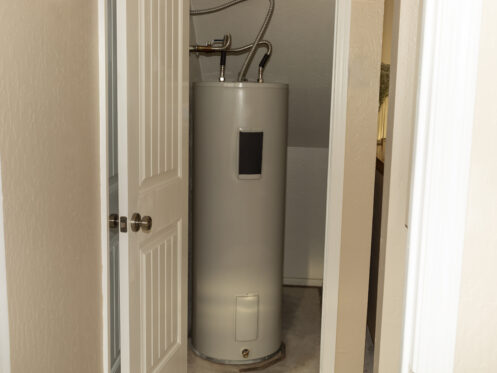Despite the importance of always having hot water, water heaters are something most people rarely give much thought to. That is, until something happens and they find themselves constantly having issues with their hot water supply. The best way to avoid this problem is to know how many more years of life your water heater likely has left so you can make sure to replace it in time.
Average Life Span of Traditional Water Heaters
The life span of a traditional water heater can vary by at least a few years, depending on the brand, model, and energy source. Cheaper gas units rarely last much longer than eight years, whereas a higher-quality gas unit may last for around 12 years. Electric units typically have a slightly longer life expectancy and may last for 12 to 15 years. The main reason gas units don’t last as long is that the extreme heat produced when the unit burns gas results in increased wear and tear and causes the tank to weaken more quickly.
Average Life Span of Tankless Water Heaters
The main reason tankless water heaters are now so popular is that they are very efficient and typically use substantially less energy than traditional water heaters. Another reason is that they usually last quite a bit longer. You can generally expect a tankless unit to last for a minimum of 15 years. In fact, the majority of these units last for at least 20 years, and some can even have a life span of up to 30 years.
One factor that contributes to tankless water heaters lasting so long is that they heat on demand. That means they typically don’t run as much per day and thus don’t experience the same amount of wear and tear as traditional units. That said, the bigger reason is that you don’t need to worry about a tankless unit rusting since it doesn’t store water. Traditional water heaters are bound to start leaking at some point due to rust and corrosion eating through the steel tank. Once this happens, the only option is to replace the unit. The problem will only get worse to the point where the tank can’t hold water at all or completely ruptures.
How Regular Maintenance Protects the Life of a Water Heater
If you want to get as much life out of your water heater as possible, the most important thing is to have a plumber service it every year. Regular maintenance is especially crucial for traditional water heaters. A traditional water heater should be flushed at least once a year to get rid of all the mineral sediment that naturally collects within the tank. If this isn’t done, so much sediment will build up that it prevents the unit from heating effectively anymore. This means you’ll end up with longer heating cycles that lead to even more wear and tear. With a gas unit, the sediment can also create major hot spots as a result of it absorbing heat from the burner below the tank. Over time, these hot spots continually weaken the steel and increase the chances of the tank beginning to leak.
The other critical part of servicing a traditional water heater is checking the condition of the anode rod. An anode rod is a long piece of steel that’s been dipped in aluminum or magnesium. Both of these other metals are less noble than steel, which means they are more susceptible to rusting and corrosion. Without the anode rod, minerals in the water would continually react with the steel tank, causing it to corrode and increasing the chances of the tank leaking. Instead, the aluminum or magnesium coating on the rod gets sacrificed. That means the minerals cause it to corrode and don’t react with the steel tank. It usually doesn’t take more than three to five years before almost the entire coating on the anode rod gets eaten away. If the anode rod isn’t replaced at this point, the tank will begin corroding and the water heater will end up leaking sooner.
If you have a tankless water heater, the main thing you need to do is have a plumber descale it once or twice a year. Descaling is done to remove mineral deposits and limescale from the unit’s heat exchanger. If this isn’t done, the layer of mineral deposits will eventually get so thick that the unit can no longer heat effectively. When that happens, your options are to replace the heat exchanger or just replace the entire water heater. Most people choose the latter since replacing the heat exchanger can sometimes cost about as much as a new water heater.
Signs It’s Time for a Water Heater Replacement
While it can happen, it’s fairly rare for either a traditional or a tankless water heater to just suddenly quit working. Instead, you’ll usually start noticing a few subtle signs or sometimes a fairly obvious indication that can help you know you need to replace your water heater.
The most obvious symptom that a traditional water heater needs to be replaced is when its tank starts leaking. This situation is considered an emergency as the high pressure inside the tank can result in it bursting and creating a serious flood. As such, the first thing to do if a traditional water heater is leaking is to shut it off. That way the pressure inside the tank will drop once the water starts cooling down. You also want to close the valve on the inlet pipe so that no more water can flow into the tank should it burst. Once the water is sufficiently cooled, the tank will then need to be drained. This is something a plumber will do for you, but you can also do it yourself.
Another fairly obvious indication that it’s time for a new water heater is if your water sometimes or never gets fully hot. This issue is something that a plumber may be able to fix, especially with a traditional electric water heater. Nonetheless, it’s usually only worth paying to repair the problem if your water heater has at least a few years of life left in it.
Increasingly high energy bills can also indicate your water heater isn’t working effectively. However, there are also various other reasons why your energy bills may be higher, such as an issue with your heating or air conditioning. One way you can potentially tell if your water heater is the culprit is by monitoring how long it typically runs and how long you have to wait to have hot water again after it runs out. With a gas unit, you usually won’t have to wait for more than 30 to 60 minutes. If you have an electric unit, it may take up to two hours to reheat. When you find yourself constantly having to wait much longer than this, it means your water heater can’t heat effectively anymore.
When you need a reliable plumbing, heating, or air conditioning contractor in Wheat Ridge, trust the experts at Fox Heating, Cooling & Plumbing. We’ve been in business since 2018 and can help when you need a replacement water heater or any other repair or maintenance services. We stock a range of high-quality water heaters from some of the best brands and will work with you to ensure you get the right option for your home.
To schedule a water heater inspection or get help choosing a replacement unit, contact us today.

